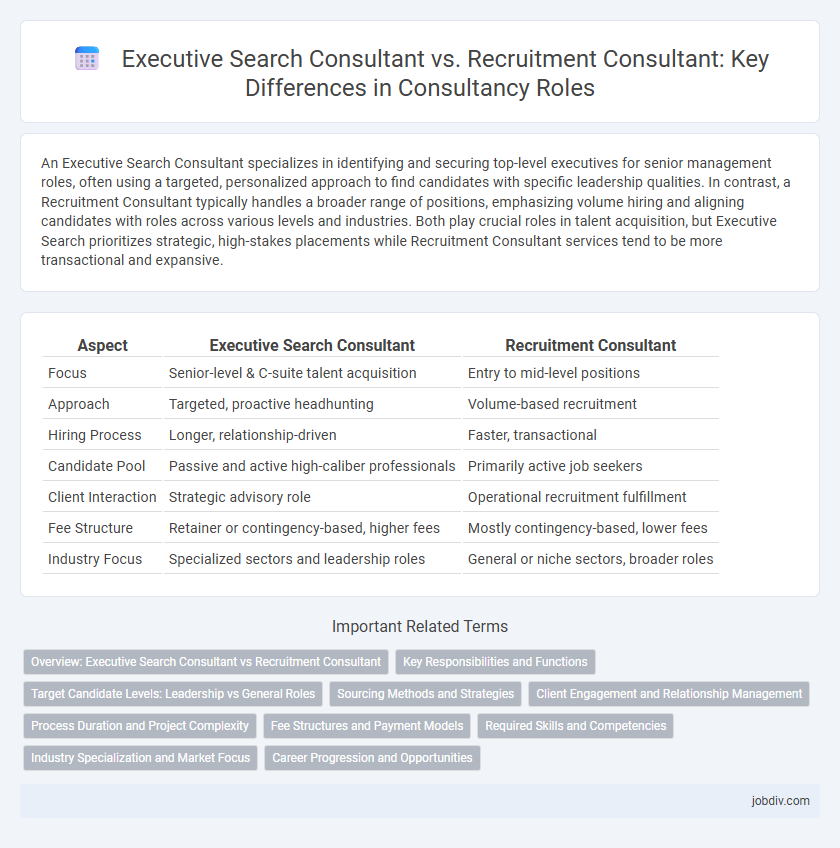An Executive Search Consultant specializes in identifying and securing top-level executives for senior management roles, often using a targeted, personalized approach to find candidates with specific leadership qualities. In contrast, a Recruitment Consultant typically handles a broader range of positions, emphasizing volume hiring and aligning candidates with roles across various levels and industries. Both play crucial roles in talent acquisition, but Executive Search prioritizes strategic, high-stakes placements while Recruitment Consultant services tend to be more transactional and expansive.
Table of Comparison
| Aspect | Executive Search Consultant | Recruitment Consultant |
|---|---|---|
| Focus | Senior-level & C-suite talent acquisition | Entry to mid-level positions |
| Approach | Targeted, proactive headhunting | Volume-based recruitment |
| Hiring Process | Longer, relationship-driven | Faster, transactional |
| Candidate Pool | Passive and active high-caliber professionals | Primarily active job seekers |
| Client Interaction | Strategic advisory role | Operational recruitment fulfillment |
| Fee Structure | Retainer or contingency-based, higher fees | Mostly contingency-based, lower fees |
| Industry Focus | Specialized sectors and leadership roles | General or niche sectors, broader roles |
Overview: Executive Search Consultant vs Recruitment Consultant
Executive Search Consultants specialize in finding high-level executives and niche professionals for senior roles, leveraging extensive networks and in-depth industry knowledge to deliver strategic hires. Recruitment Consultants typically focus on filling a broader range of positions, from entry-level to mid-management, using volume-driven processes and job board advertising. Executive search emphasizes tailored, confidential approaches for critical leadership roles, while recruitment consultancy prioritizes faster placements across various sectors.
Key Responsibilities and Functions
Executive Search Consultants specialize in identifying and attracting top-level talent for senior executive roles, focusing on detailed market research, candidate assessment, and confidentiality in the hiring process. Recruitment Consultants manage a broader range of positions, handling end-to-end recruitment tasks including job posting, candidate sourcing, screening, and client coordination for various job levels. Both roles require strong communication and negotiation skills, but Executive Search Consultants often engage in targeted headhunting and strategic talent mapping, while Recruitment Consultants emphasize volume hiring and process efficiency.
Target Candidate Levels: Leadership vs General Roles
Executive Search Consultants specialize in sourcing top-tier leadership candidates, including C-suite executives and senior management, by leveraging extensive networks and targeted strategies. Recruitment Consultants primarily focus on filling general roles across various levels, emphasizing volume and efficiency in placing qualified professionals for mid to entry-level positions. The distinction lies in the complexity and seniority of the target candidate pool, with Executive Search demanding a deeper, relationship-driven approach for high-impact leadership appointments.
Sourcing Methods and Strategies
Executive Search Consultants specialize in sourcing high-level candidates through targeted headhunting, leveraging extensive networks, and confidential outreach strategies tailored for senior and niche roles. Recruitment Consultants employ broad-based sourcing methods including job boards, social media platforms, and mass advertising to attract a wide range of candidates for mid-level to entry positions. The executive search process prioritizes passive candidate engagement and relationship building, whereas recruitment relies heavily on active candidate pools and volume-driven placements.
Client Engagement and Relationship Management
Executive Search Consultants specialize in identifying and engaging top-tier executive talent through tailored strategies that emphasize deep client collaboration and understanding of organizational culture. Recruitment Consultants manage a broader range of hiring needs, often volume-based, with a focus on efficient candidate sourcing and transactional client interactions. Effective client engagement in executive search relies on long-term relationship management and advisory partnership, whereas recruitment consultancy prioritizes timely, process-driven communication to meet immediate hiring demands.
Process Duration and Project Complexity
Executive Search Consultants typically manage longer process durations due to the high complexity of sourcing top-tier, specialized leadership talent, often spanning several months to ensure quality and cultural fit. Recruitment Consultants usually handle shorter, high-volume hiring projects with less complexity, focusing on rapid candidate placement within weeks. The detailed vetting and strategic alignment in executive search demand intensive research and personalized engagement compared to the broader, faster recruitment approach.
Fee Structures and Payment Models
Executive Search Consultants typically operate on retained fee structures, receiving an upfront payment or a fixed retainer that ensures dedicated and exclusive candidate sourcing, with final fees often based on a percentage (usually 30-35%) of the placed candidate's first-year total compensation. Recruitment Consultants generally work on a contingency or success-fee basis, getting paid only when a candidate is successfully placed, with fees ranging from 15-25% of the candidate's starting salary, offering a more flexible but less guaranteed payment model. The choice between these models depends on the client's urgency, the level of candidate exclusivity required, and the complexity of the hiring process.
Required Skills and Competencies
Executive Search Consultants require advanced skills in strategic thinking, relationship management, and market intelligence to identify and engage top-tier leadership talent for specialized roles. Recruitment Consultants focus on strong communication, negotiation, and candidate assessment skills to efficiently fill a broader range of positions across industries. Both roles demand proficiency in client relationship building and an in-depth understanding of industry-specific hiring trends.
Industry Specialization and Market Focus
Executive Search Consultants typically specialize in industry-specific talent acquisition for senior-level and niche roles, leveraging deep market insights and extensive networks within sectors such as finance, technology, or healthcare. Recruitment Consultants often operate with a broader market focus, managing volume hiring across various industries and levels, prioritizing speed and efficiency. The specialized approach of Executive Search Consultants enables targeted, strategic hiring aligned with long-term business goals, while Recruitment Consultants emphasize filling diverse roles rapidly to meet immediate staffing needs.
Career Progression and Opportunities
Executive Search Consultants typically work with senior-level and specialized roles, offering advanced career progression opportunities within high-impact industries and leadership advisory firms. Recruitment Consultants often handle a broader range of positions, providing diverse experience but with a more linear career path compared to the strategic focus of executive search. Both roles require strong networking skills, though Executive Search Consultants gain deeper industry insights and higher earning potential through long-term client relationships.
Executive Search Consultant vs Recruitment Consultant Infographic

 jobdiv.com
jobdiv.com